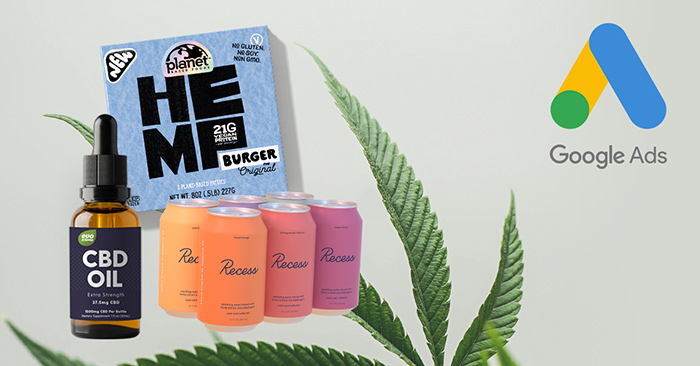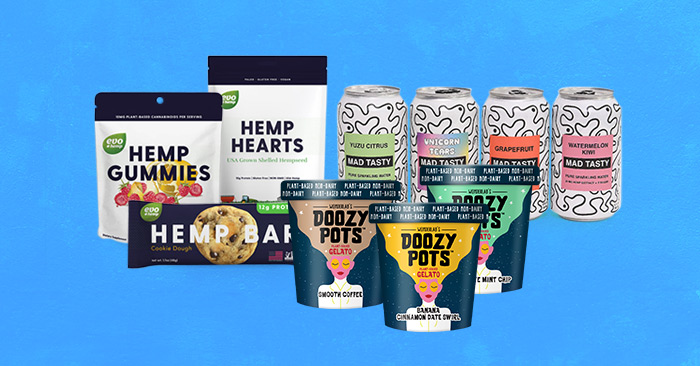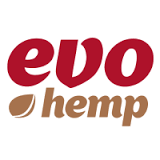Digital Advertising Has A Hemp Policy Problem

Digital advertising has become a nightmare for hemp food and beverage brands, regardless of whether or not their products contain CBD.
The two leading digital ad providers – Google and Meta – made it increasingly challenging for hemp brands to use their platforms beginning around 2018, when the Farm Bill passed and regulated production of hemp in the U.S. began. Despite the fact hemp is a Generally Recognized As Safe (GRAS) ingredient by the U.S. Food and Drug Administration (FDA) and hemp-based food brands had been utilizing the ad platforms for years prior to the Farm Bill, those companies began receiving notices that their content was prohibited and were at times accused of promoting drugs.
Combined, Google and Meta collect nearly half the total ad dollars from digital campaigns annually, although by the end of last year that market share had reportedly dropped to 48.4%, with the expectation that it would continue to fall throughout the year.
So some in the hemp business breathed a sigh of relief when, in late December, Google Ads expanded its policies to permit CBD-infused pharmaceutical and topical product advertisements on the platform in California, Colorado and Puerto Rico.
While CBD food and beverages makers remain banned – likely until the FDA releases guidance for CBD use – the advertising engine did remove CBD from its Unapproved Pharmaceuticals and Supplements list. This may signal looser advertising restrictions are on the horizon for the broader set of hemp products, including food and beverage.
Hemp’s Search History
Prior to 2017, advertising non-CBD hemp products on Google Ads was easy, said Ari Sherman, co-founder of Evo Hemp, a hemp food and supplement company that makes both CBD and non-CBD products. Evo had been using the platform without any issues since 2013 and had even received an invitation from Google Ads to join a pilot program for small businesses. However, as the hemp industry began to gain traction in the U.S. and new products entered the market, promoting even Evo’s non-CBD products through the platform quickly became impossible, Sherman said.
“At first I was able to reach out to Google and explain to them that our keywords like hemp bar’ and ‘hemp foods’ were not against their advertising policies,” said Sherman. “We even got some of those ads temporarily turned back on. But as time went on eventually all of our ads were taken down. After a year of back and forth with Google’s advertising department we eventually stopped our Ads campaign with them.”

Evo isn’t alone in this battle. Plant-based protein brand Planet Based Foods has also been unable to advertise its hemp protein-based burgers, crumbles, and taquitos through the platform as well. Launched in the U.S. in early 2022, the brand relies on its hemp-based ingredient deck to differentiate its products within the saturated plant-based protein market.
“Google Ads does not currently allow brands to bid on hemp as a search term, or use hemp in targeting so we have not included hemp in our ads,” said Braelyn Davis, CEO of Planet Based Foods. “The restrictions around hemp have meant that we have bid on broader search terms like ‘vegan’ and ‘plant-based meat’.”
The issue isn’t isolated to Google Ads, either; both Davis and Sherman have encountered similar barriers while attempting to promote their products through social media including on Meta (Facebook and Instagram), YouTube (owned by Google), TikTok and Snapchat. On Meta, Planet Based Foods has had product images cited as prohibited content due to its label, which features the word ‘hemp’ in large metallic letters.
Evo has been banned from advertising its hemp-based food items on Meta platforms entirely, which Sherman said is especially frustrating since the products are regulated and sold in retail stores around the world. According to Sherman, TikTok, which has begun to steal some of Google and Meta’s ad market share, also has some discordant policies.
“On TikTok we are not allowed to pay for traffic that goes directly to our website but they are allowing us to pay for ads that stay inside their platform,” he explained. “For example, they will allow us to run ads that are only to grow our following and video views inside of TikTok. However the moment we try to run those exact same ads to our website they are flagged for ‘promoting drugs.’”
Loosening Up
Nevertheless, Sherman is hopeful Google’s recent action will make it easier to promote both non-CBD products and CBD topicals on all platforms. He believes this preliminary move regarding CBD may also help drive awareness and knowledge within Google Ad’s itself and lead to more distinction between hemp and associated compounds like CBD and THC.
“The awareness and use of CBD products has grown tremendously over the last 10 years and I do think this is a signal of changes in the macro-thinking around these products,” said Sherman. “Just looking at the recent pro-CBD policy changes in major sports organizations like The World Anti Doping Agency (WADA), the US Anti Doping Agency (USADA), the National Hockey League (NHL) and the MLB (Major League Baseball), this signals a huge shift in the attitudes around CBD products.”
Sherman believes Google is a bit ahead of the FDA in terms of policies. Both Sherman and Bethany Gomez, managing director and co-founder of CBD-focused market research firm Brightfield Group, believe that the December change by Google may signal the tech giant is preparing to open the door to CBD advertising.
“If this pilot is successful, we may expect a gradual liberalization of regulations towards CBD, and potentially even cannabis based products over the medium term, as Google and other tech companies are looking to find new revenue streams,” said Gomez. “I think they very well could loosen [restrictions], particularly for states with explicit regulations allowing for the sale of CBD products. It’s clear from the way this is written that they are trying to comply with state laws, so they are leaving the door open for loosening of regulations to align with state laws.”
While the FDA’s guidance on CBD use has been delayed numerous times since the passage of the Farm Bill in 2018, some reports suggest a draft could finally be published in Q1 of this year, and as early as next month.


















